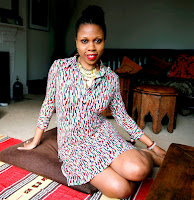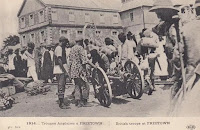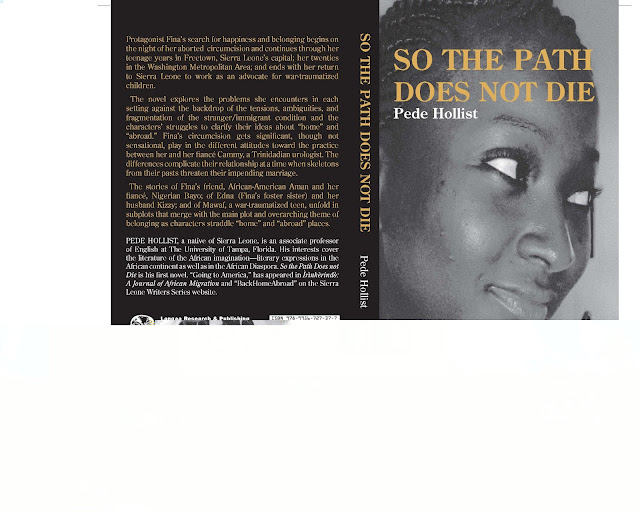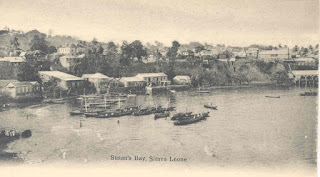Vitabubooks Interview | Precious Wiliiams
Precious Williams is a journalist and author of the memoir Precious, A True Story, published by Bloomsbury in August 2010. A German translation of the book, titled Farbenblind, was published in October 2010 and a US edition, titled Color Blind, is published by Bloomsbury USA. Precious's first book is about growing up in trans-racial 'private foster care'. Vitabu Books presents a candid conversation with the author.
Vitabu Books: In your brilliant interview with Belinda Otas, you said it took you about a year to write Precious, but several more years to do all the research. Exactly how long was the process? Can you walk us through the time period? When did you start thinking you wanted to write a book about your experiences? What made you want to do it? You mention documents and data you collated with a lawyer and having family members read the manuscript and give feedback? What was that like? Did it make a difference? How?
Precious Williams: It took me about a year to write 'Precious' (aka 'Color Blind') and another three years to complete all the research. The research included appearing before a Judge at the Family Court in London to plea for access to childhood court records. Fortunately the Judge agreed to release my records. The next step was accessing my Social Services files, incredibly it took Social Services more than two years to release my childhood files to me. When it came to the fact-checking process, I found that my memory had been surprisingly accurate, even of events that happened when I was very young indeed. The next step was to have family members read the manuscript and I found that nerve-wracking, although in the end it turns I needn't have worried – my family readers didn't ask me to change a word.
While my book is about my search for identity, it also details various forms of abuse I experienced as child. You absolutely cannot publish such assertions without
proof and so a lawyer worked through my manuscript very carefully, liaising with members of my family in order to corroborate events, dates and facts. The enormous
bundle of court and Social Services documents I had in my possession by this time proved immensely useful as it meant there were detailed notes recorded way back then by third parties which backed up my story.
Why did I choose to write about my own experiences?
My own story kept creeping into everything else I tried to write, so in the end I had to just let it flow. I do not think I had realized how stressful writing and promoting a memoir would be until it was too late! Putting my own life story out there was rather like appearing naked in public (something I had experienced as I used to work as a life model). But of course the memoir is not just about me - I was (and am) also responsible for protecting the feelings of my loved ones and family members, while at the same time trying to tell my story as clearly and fully as possible. With every line I wrote, and later, in every media interview I gave, I was desperately worrying about how various family members would feel about what I was writing or saying. In the end, to my absolute surprise and delight, the publication and discussion of the book brought me much closer to my family members, especially to my foster family. My foster-aunty has accompanied me to several book signing/reading events and she says she feels famous now that she is a character in a book!
Vitabu Books: One reader described your book as something that's `out of your hands' and 'touching many different people in many different ways. This January you reflected on your experiences in What kind of family matters? How have your views on private fostering/adoption changed since you started this global conversation on family?
Precious Williams: I grew up utterly immersed in 'private fostering', where the natural parent gives the child to strangers or acquaintances (or sometimes extended family) to be looked after on an informal basis. I was privately fostered and so was one of my half-siblings, so were several of my cousins. I thought private fostering was totally normal. When I visited Nigeria as a young child, I found that my maternal grandmother informally fostered children of family members. There seemed to be an "it takes a whole village" attitude to child-rearing. But to my white English peers the process was bizarre, dangerous, [and] barbaric. They didn't understand at all. It's an ongoing conversation….
Vitabu Books: If you could do it all over again what would you do differently? In the writing/publishing process?
Precious Williams: Wow. This is a hard question to answer. I'm really proud of my book and I'm thrilled with the way the entire process has had a healing effect on family relationships. But, it was so, so, so intense. I still feel drained not so much from the writing but from the emotional fall-out (even the good stuff). If I could do it again maybe I'd write my life story but disguise it as a novel! As for the writing/publishing process, it couldn't have been better. I was in the amazingly fortunate position of being able to "pick" my publisher. I had an initial offer on the book from one of my dream publishing houses. Then a second offer came through, then a third offer from another of my dream publishing houses. In the end I met up with editors at the two final bidders and one paperback editor said something like "Please choose us," and I thought that was so lovely and unpretentious that my mind was made up instantly. It was the best decision I could have made!
Vitabu Books: What tips do you have for budding writers with compelling life stories out there?
Precious Williams: In my opinion it's important not to censor yourself at all in your very first draft. And don't ever give up!
Vitabu Books: What are you working on now? What's next?
Precious Williams: I'm finishing my second book which is a novel. An historical novel. I'm utterly excited about it, so that's a good sign.




Comments
Post a Comment